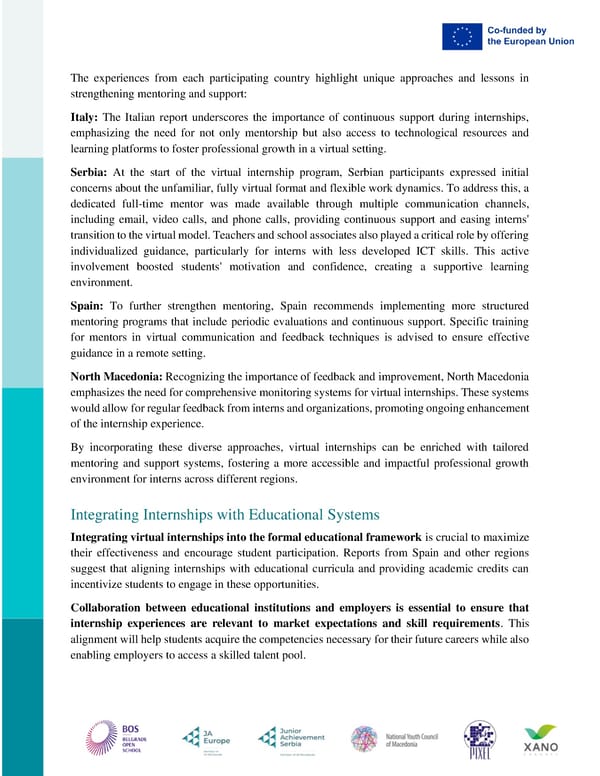The experiences from each participating country highlight unique approaches and lessons in strengthening mentoring and support: Italy: The Italian report underscores the importance of continuous support during internships, emphasizing the need for not only mentorship but also access to technological resources and learning platforms to foster professional growth in a virtual setting. Serbia: At the start of the virtual internship program, Serbian participants expressed initial concerns about the unfamiliar, fully virtual format and flexible work dynamics. To address this, a dedicated full-time mentor was made available through multiple communication channels, including email, video calls, and phone calls, providing continuous support and easing interns' transition to the virtual model. Teachers and school associates also played a critical role by offering individualized guidance, particularly for interns with less developed ICT skills. This active involvement boosted students' motivation and confidence, creating a supportive learning environment. Spain: To further strengthen mentoring, Spain recommends implementing more structured mentoring programs that include periodic evaluations and continuous support. Specific training for mentors in virtual communication and feedback techniques is advised to ensure effective guidance in a remote setting. North Macedonia: Recognizing the importance of feedback and improvement, North Macedonia emphasizes the need for comprehensive monitoring systems for virtual internships. These systems would allow for regular feedback from interns and organizations, promoting ongoing enhancement of the internship experience. By incorporating these diverse approaches, virtual internships can be enriched with tailored mentoring and support systems, fostering a more accessible and impactful professional growth environment for interns across different regions. Integrating Internships with Educational Systems Integrating virtual internships into the formal educational framework is crucial to maximize their effectiveness and encourage student participation. Reports from Spain and other regions suggest that aligning internships with educational curricula and providing academic credits can incentivize students to engage in these opportunities. Collaboration between educational institutions and employers is essential to ensure that internship experiences are relevant to market expectations and skill requirements. This alignment will help students acquire the competencies necessary for their future careers while also enabling employers to access a skilled talent pool.
 Policy Recommendations Page 7 Page 9
Policy Recommendations Page 7 Page 9